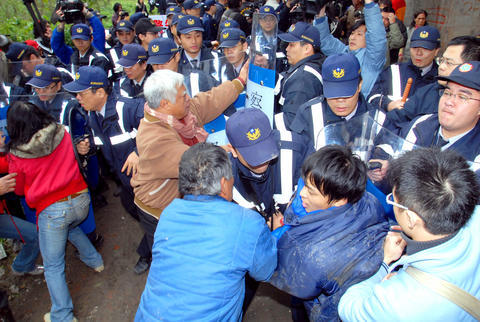Clashes broke out between police and activists yesterday morning as approximately 100 police officers escorted a demolition team sent to flatten the Sanying Aboriginal Community (三鶯部落) in Taipei County.
The community is scattered on the river banks on both sides of Sanying Bridge (三鶯大橋), which connects Sansia (三峽) and Yingge (鶯歌) townships.
Most of the residents are Amis Aborigines who moved to Taipei to work as construction workers or miners. As they were unable to afford housing in the city, they built their own homes on the east bank of Dahan River (大漢溪) with whatever materials they could find more than 20 years ago.

PHOTO: HUANG LI-HSIANG, TAIPEI TIMES
After having torn down most of the homes in the community located in what is legally defined a "flood area" last week, the county government flattened the last nine homes yesterday, in line with its announcement last week.
But when the demolition team -- escorted by the police -- moved into the community at approximately 9am, they were confronted by nearly 40 activists and residents.
The activists included Aboriginal students from National Taiwan University and National Chengchi University, members of the Sijhou Aboriginal Community Self-Help Organization, the Youth Alliance for Losheng, the Taiwan Association for Human Rights, documentary makers and Aboriginal activist and musician Kimbo Hu (胡德夫).
The activists formed a defensive line with bamboo sticks and a human chain, putting the residents behind them.
The police, with shields in hand, pushed through and some protesters fell, while other activists shoved or engaged in verbal exchanges with the police.
Protester Lin Wan-chun (林婉純) was injured and taken to a hospital nearby, while nine other protesters were taken into police custody.
After the police had cleared the scene, the demolition team moved in and flattened the community within an hour-and-a-half.
A simple shelter, with only a wooden frame covered in canvas, which Pan Chin-hua (潘金花) erected after her house was torn down last Thursday, was considered "illegal" and dismantled.
Although they have become homeless, many of the residents have decided to stay at the site.
Families could be seen gathered around bonfires burning wooden structures from their demolished houses on the ground where their home used to be.
There were tents, food, water and clothes donated by the community's supporters from around the country.
"I'll rebuild my home right here," Pan said, while boiling a kettle full of water on a fire on the ground where her home was a week ago.

Alain Robert, known as the "French Spider-Man," praised Alex Honnold as exceptionally well-prepared after the US climber completed a free solo ascent of Taipei 101 yesterday. Robert said Honnold's ascent of the 508m-tall skyscraper in just more than one-and-a-half hours without using safety ropes or equipment was a remarkable achievement. "This is my life," he said in an interview conducted in French, adding that he liked the feeling of being "on the edge of danger." The 63-year-old Frenchman climbed Taipei 101 using ropes in December 2004, taking about four hours to reach the top. On a one-to-10 scale of difficulty, Robert said Taipei 101

Taiwanese and US defense groups are collaborating to introduce deployable, semi-autonomous manufacturing systems for drones and components in a boost to the nation’s supply chain resilience. Taiwan’s G-Tech Optroelectronics Corp subsidiary GTOC and the US’ Aerkomm Inc on Friday announced an agreement with fellow US-based Firestorm Lab to adopt the latter’s xCell, a technology featuring 3D printers fitted in 6.1m container units. The systems enable aerial platforms and parts to be produced in high volumes from dispersed nodes capable of rapid redeployment, to minimize the risk of enemy strikes and to meet field requirements, they said. Firestorm chief technology officer Ian Muceus said

MORE FALL: An investigation into one of Xi’s key cronies, part of a broader ‘anti-corruption’ drive, indicates that he might have a deep distrust in the military, an expert said China’s latest military purge underscores systemic risks in its shift from collective leadership to sole rule under Chinese President Xi Jinping (習近平), and could disrupt its chain of command and military capabilities, a national security official said yesterday. If decisionmaking within the Chinese Communist Party has become “irrational” under one-man rule, the Taiwan Strait and the regional situation must be approached with extreme caution, given unforeseen risks, they added. The anonymous official made the remarks as China’s Central Military Commission Vice Chairman Zhang Youxia (張又俠) and Joint Staff Department Chief of Staff Liu Zhenli (劉振立) were reportedly being investigated for suspected “serious

Nipah virus infection is to be officially listed as a category 5 notifiable infectious disease in Taiwan in March, while clinical treatment guidelines are being formulated, the Centers for Disease Control (CDC) said yesterday. With Nipah infections being reported in other countries and considering its relatively high fatality rate, the centers on Jan. 16 announced that it would be listed as a notifiable infectious disease to bolster the nation’s systematic early warning system and increase public awareness, the CDC said. Bangladesh reported four fatal cases last year in separate districts, with three linked to raw date palm sap consumption, CDC Epidemic Intelligence